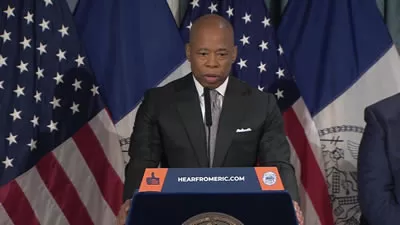Wahsington, DC. The Biden-Harris Administration continues to prioritize global health security as a critical component of national biodefense. The COVID-19 pandemic, as well as HIV/AIDS, Ebola, mpox and other outbreaks in recent years, has demonstrated the catastrophic impacts infectious diseases can have on health, economies, and societies, regardless of where they start. The United States partners with countries around the world to build stronger global health security capacity – the ability to prevent, detect, rapidly respond to, and recover from new and emerging public health threats and prevent their spread across borders. Partnering with countries to stop infectious disease threats at their source, including by strengthening equitable health systems in their own countries and across regions, effectively protects the health of Americans and people across the world.
To show the American people the impact of these life-saving investments, the Administration is releasing its annual report, Progress and Impact of U.S. Government Investments in Global Health Security today. This report highlights the Administration’s bold actions to accelerate implementation of the National Biodefense Strategy and Implementation Plan for Countering Biological Threats, Enhancing Pandemic Preparedness, and Achieving Global Health Security.
EXPANDING GLOBAL HEALTH SECURITY PARTNERSHIPS
By 2025, the United States is committed to directly supporting at least 50 countries to strengthen and achieve regional, national and local capacity in five critical areas to prevent, detect, and respond to infectious disease threats. Building these capabilities accelerates country compliance with the International Health Regulations (IHR) and helps reach the 2024 Global Health Security Agenda (GHSA) target. In 2022, the Unites States expanded our bilateral global health security support from 19 to 25 partner countries: Bangladesh, Burkina Faso, Cameroon, Côte d’Ivoire, Democratic Republic of the Congo (DRC), Ethiopia, Ghana, Guatemala, Guinea, India, Indonesia, Kenya, Liberia, Mali, Mozambique, Nigeria, Pakistan, the Philippines, Senegal, Sierra Leone, Tanzania, Uganda, Ukraine (when the operating environment allows), Vietnam and Zambia. These partnerships strengthened disease surveillance and early warning systems, biosafety and biosecurity, emergency operations, training and support for health workers, community and national leadership for global health security, and legal preparedness.
The United States employs a whole-of-government approach, assisting partners to strengthen regional, national and local health systems to better prevent, detect, and respond to biological threats in a safe and secure manner, through the combined efforts of the U.S. Department of State, U.S. Department of Health and Human Services U.S. Agency for International Development, U.S. Department of Defense, and others. To directly achieve these measurable results and support additional crosscutting and multilateral global health security activities, the United States has provided nearly $800 million in bilateral support in Fiscal Year 2022 funds, an increase of over $350 million from Fiscal Year 2021, with broader complementary program investments further supporting these efforts. The Administration will continue to utilize the whole-of-government effort outlined in Executive Order 13747, Executive Order 13987, and National Security Memorandum-15 to accelerate progress.
DELIVERING RESULTS FROM UNITED STATES INVESTMENTS
Investing in global health security today to avert the next global pandemic could save trillions of dollars and millions of lives. The report released today details key outcomes from our Fiscal Year 2022 partner country activities, including that seven of our partner countries achieved demonstrated capacity across five technical areas — improving their ability to prevent, detect, and respond to infectious disease threats. Additionally, six countries are close to achieving this goal. Across partner countries, there has been substantial progress in strengthening zoonotic disease control, national laboratory capacity, emergency preparedness, and risk communication. The report spotlights the impact of United States investments in partnership with countries, such as: the creation of a COVID-19 Country Systems Monitoring Tool in 48 countries to track progress; in Burkina Faso, the development of standard operating procedures for international airports for the detection and management of ill travelers; and in Vietnam, doubling the number of healthcare facilities enrolled in a national surveillance network for healthcare associated infections. The results are clear: investing in preparedness and prevention saves lives, strengthens resilience, and yields tangible results, including helping to rapidly address outbreaks of Ebola, yellow fever, Lassa fever, polio, influenza, and many others.
SPURRING OTHER DONORS AND MULTILATERAL PARTNERS TO ACT
Global health security is vital for international security and solidarity, and cannot be achieved alone. In addition to expanding bilateral partnerships, the United States will:
- Use its unparalleled catalytic leadership to unlock more commitments from allies, donors, and other partners to bolster support for an additional 50 countries.
- Strengthen and support extension of the multilateral GHSA beyond 2024, as a forum for working across countries, regions, and sectors to provide technical assistance, share best practices, and measure and hold global partners accountable for progress.
- Continue support to the Pandemic Fund at the World Bank, as a founding Board Member and the largest contributor, to deliver early impact for those countries and regions most in need of capital to prepare for future pandemics through grant funding.
- Accelerate achieving G7 goals set by the United States and its close partners in 2023, including meeting G7 Pact for Pandemic Readiness milestones towards assisting at least 100 countries, and collaborating with Italy’s G7 and Brazil’s G20 presidencies to increase pandemic preparedness and response financing, bolster medical countermeasure development and delivery, and match the United States’ own 50 country target commitment; and
- Strengthen the global health security architecture, including WHO strengthening, and engage in ongoing negotiations to amend the IHR and develop a Pandemic Accord.
[1] Demonstrated capacity is defined as achieving a level four on the World Health Organization (WHO) Joint External Evaluation (JEE) scale or 80 percent achievement on the WHO’s International Health Regulations Monitoring and Evaluation Framework (IHR MEF), or comparable level on other appropriate health security assessments.
DECEMBER 30 3023 . WASHINGTON DC.
WHITE HOUSE – BRIEFING ROOM – STATEMENTS AND RELEASES
SOURCE: WHITE HOUSE WH.GOV – Midtown Tribune news
– Big New York news BigNY.com














